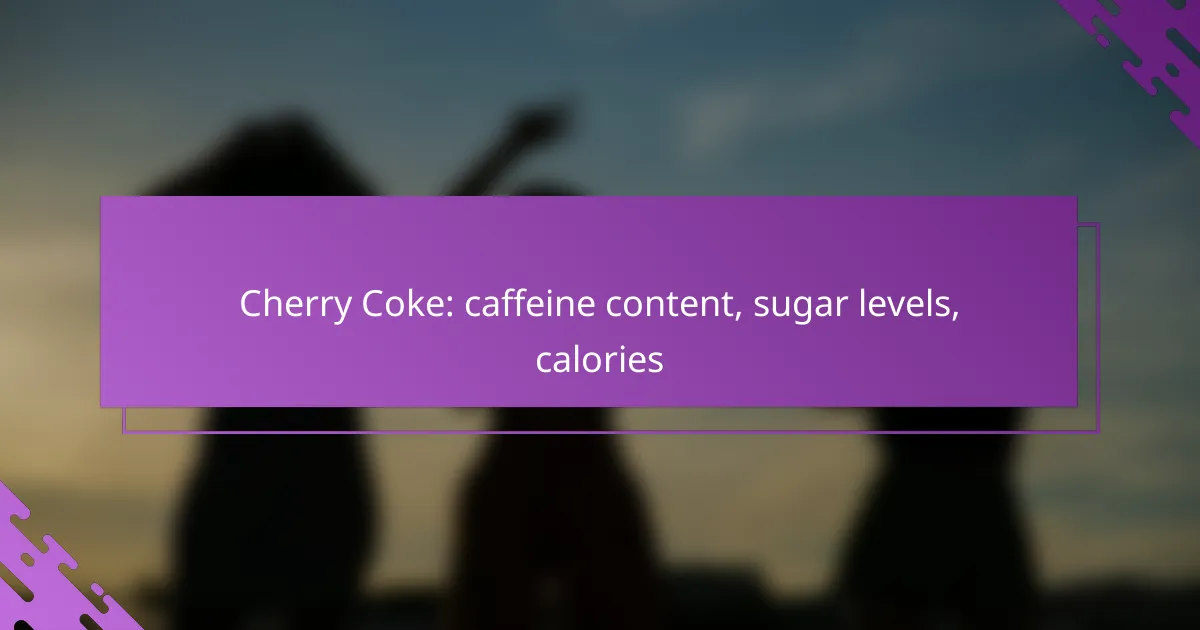Cherry Coke is a popular soft drink known for its unique cherry flavor and moderate caffeine content, with a standard 12 oz can containing about
Category: Health Considerations for Cherry Cokes
Cherry Coke, while a popular beverage, raises several health concerns due to its high sugar content, caffeine levels, and artificial ingredients. Excessive consumption can lead to weight gain and other health issues, making it essential to consider moderation in its intake. For those seeking healthier options, there are various alternatives available that can satisfy cravings without the associated risks.

Cherry Almond Coke is a unique beverage that combines the sweetness of cherry with the nutty undertones of almond, creating a refreshing flavor balance. While

Cherry Mint Coke is a delightful beverage that combines the invigorating flavors of cherry and mint with the classic taste of Coca-Cola. This refreshing drink
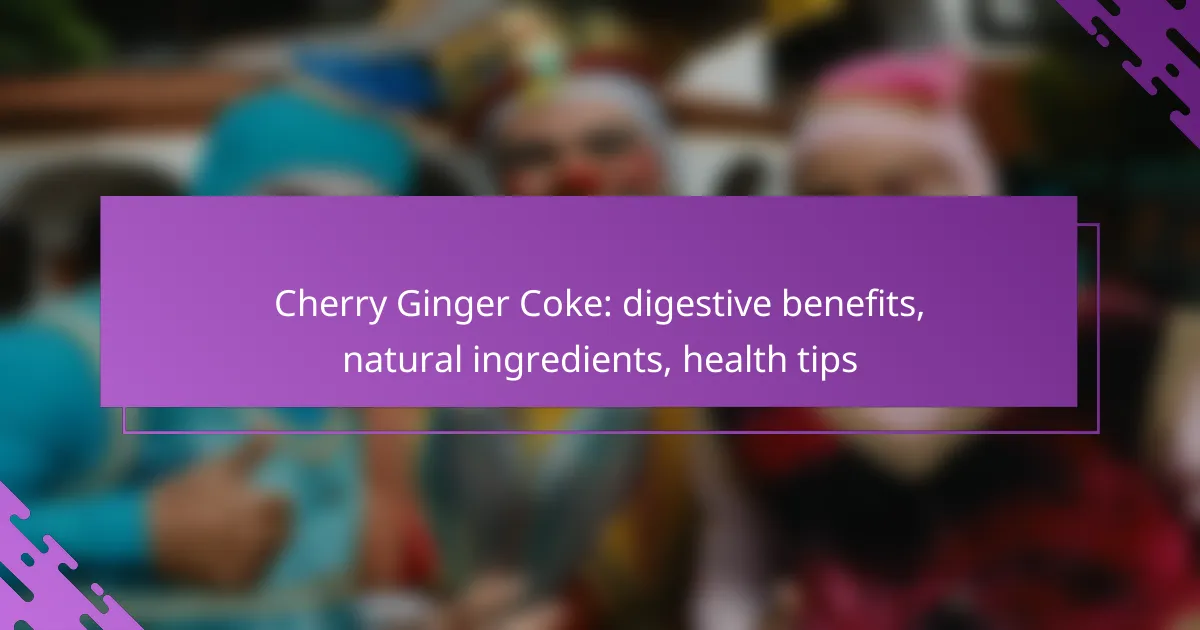
Cherry Ginger Coke is a refreshing beverage that not only tantalizes the taste buds but also offers notable digestive benefits thanks to its natural ingredients
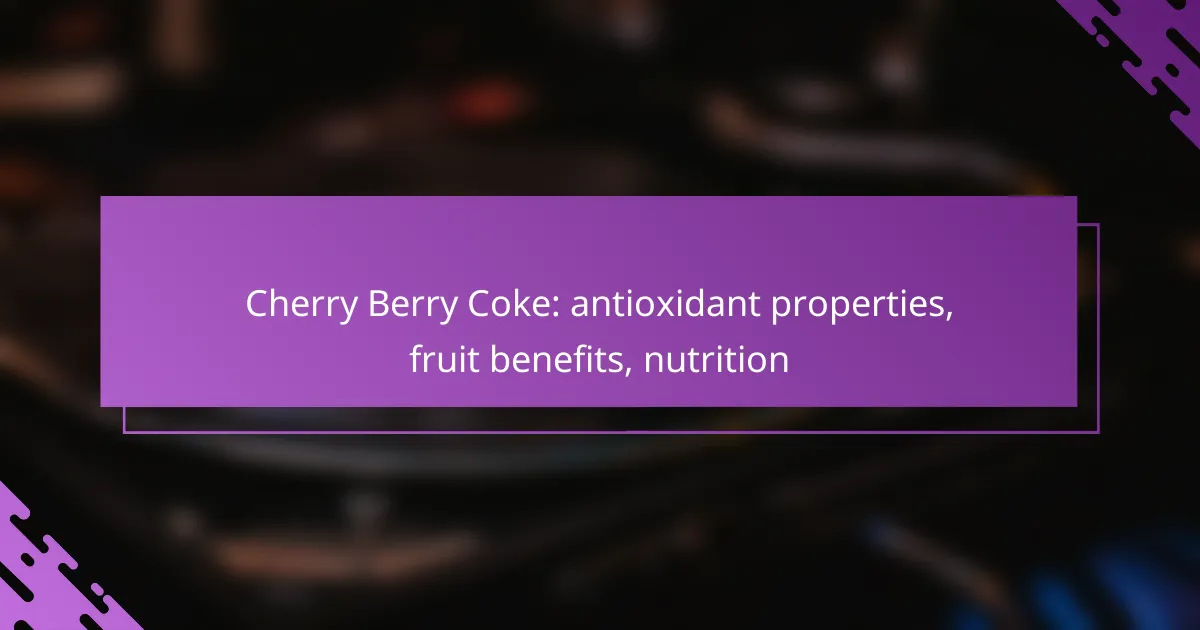
Cherry Berry Coke is a refreshing beverage that combines the delightful flavors of cherries and berries while providing essential antioxidants that help combat free radicals
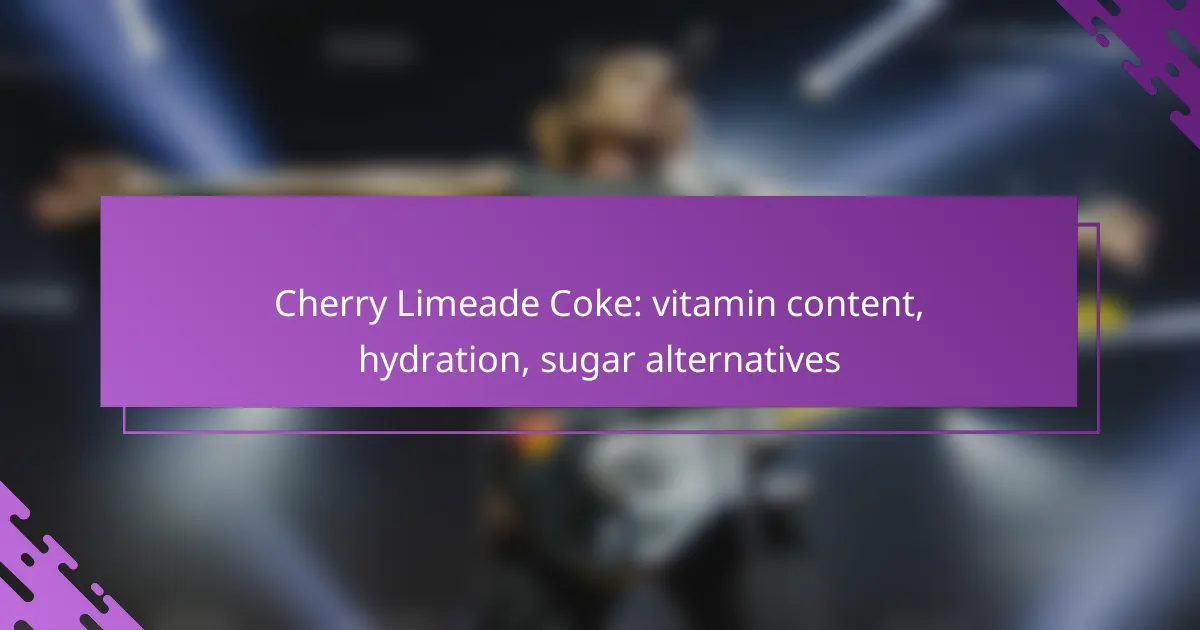
Cherry Limeade Coke is a refreshing beverage that hydrates mainly through its water content, though the sugar and caffeine it contains can influence overall hydration
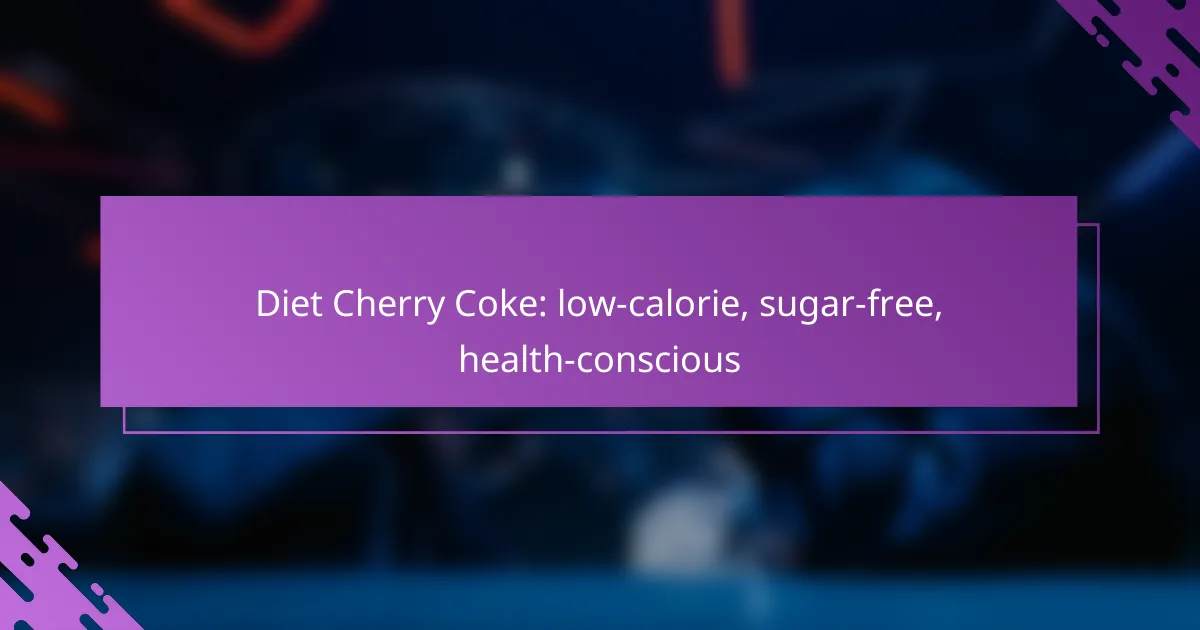
Diet Cherry Coke is a refreshing, low-calorie, and sugar-free alternative to traditional Cherry Coke, making it an appealing choice for health-conscious consumers. With its vibrant

Cherry Coke Zero is a low-calorie beverage that appeals to those seeking to reduce sugar intake without sacrificing sweetness. However, its reliance on artificial sweeteners,

Cherry Cola is a beloved classic that can be easily made at home, allowing for personalized flavor and sweetness adjustments. However, it’s important to be
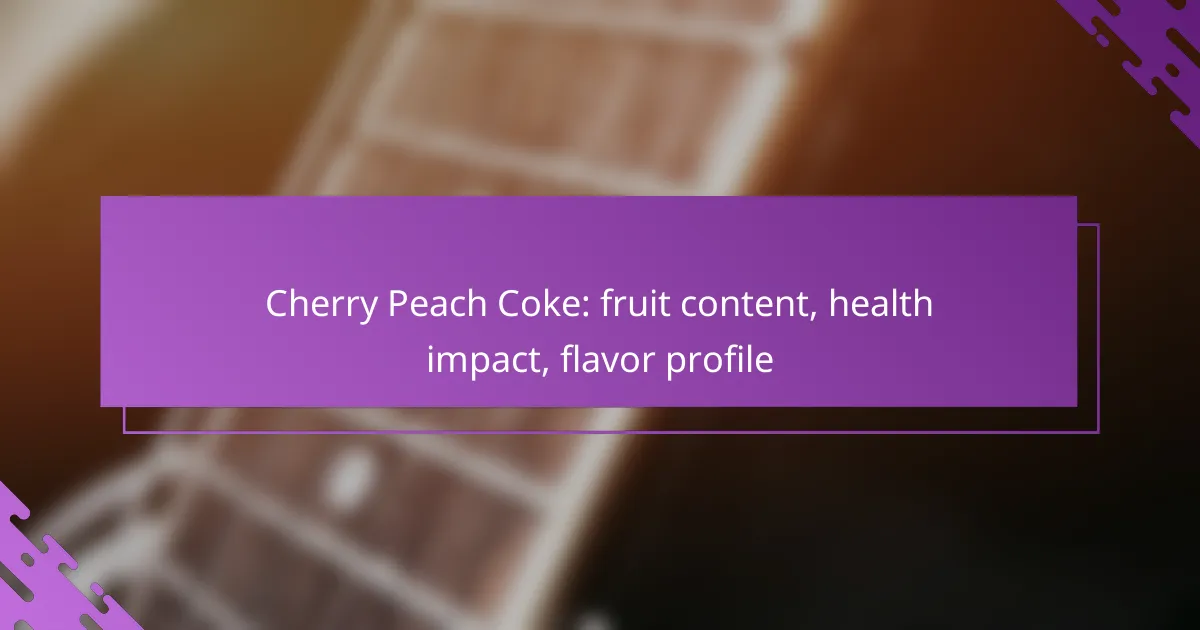
Cherry Peach Coke offers a delightful fusion of cherry and peach juices, resulting in a refreshing and unique flavor profile that combines fruity sweetness with
What are the health risks of Cherry Coke in the UK?
Cherry Coke poses several health risks in the UK, primarily due to its high sugar content, caffeine levels, and artificial ingredients. These factors can contribute to various health issues if consumed excessively.
High sugar content
Cherry Coke contains a significant amount of sugar, often exceeding 10 grams per 100 milliliters. Regular consumption can lead to weight gain, increased risk of type 2 diabetes, and dental problems. The UK guidelines recommend limiting added sugars to no more than 5% of daily caloric intake, which is about 30 grams for adults.
To mitigate these risks, consider moderating your intake of sugary drinks. Opt for smaller serving sizes or choose alternatives like sparkling water with a splash of cherry flavoring.
Caffeine effects
Cherry Coke contains caffeine, which can lead to increased heart rate, anxiety, and sleep disturbances if consumed in large quantities. A standard can typically contains around 30-40 mg of caffeine, which is lower than a cup of coffee but can still contribute to daily limits.
For those sensitive to caffeine, it is advisable to monitor total daily intake from all sources, aiming to stay below 400 mg for most adults. Limiting consumption in the afternoon and evening can help reduce sleep disruption.
Artificial ingredients
Cherry Coke includes artificial flavors and preservatives, which some studies suggest may have negative health effects when consumed frequently. Ingredients like phosphoric acid can contribute to lower bone density over time.
To avoid potential health risks, consider checking the ingredient list and opting for beverages with natural ingredients. Reducing overall consumption of sodas can also benefit long-term health.
How does Cherry Coke affect weight management?
Cherry Coke can influence weight management primarily through its caloric content and potential effects on appetite. Regular consumption of sugary beverages like Cherry Coke may contribute to weight gain if not balanced with overall dietary habits.
Caloric intake
A standard 12-ounce (355 ml) can of Cherry Coke contains approximately 140 calories, primarily from added sugars. If consumed frequently, these extra calories can accumulate, making it easier to exceed daily caloric needs, especially if not offset by physical activity.
To manage weight effectively, consider tracking your caloric intake from beverages. Replacing sugary drinks with water or low-calorie alternatives can significantly reduce overall calorie consumption.
Impact on appetite
Cherry Coke may affect appetite regulation due to its high sugar content. Sugary drinks can lead to increased hunger shortly after consumption, potentially resulting in overeating during meals or snacking later in the day.
Be mindful of how Cherry Coke fits into your eating patterns. If you find that it triggers cravings or leads to larger portion sizes, it may be beneficial to limit its intake or choose smaller serving sizes to maintain better control over your appetite and weight management efforts.
What are the alternatives to Cherry Coke?
Alternatives to Cherry Coke include various options that cater to different preferences, such as lower-calorie sodas, natural fruit beverages, and homemade drinks. Each alternative offers unique benefits and can be tailored to suit individual taste and health considerations.
Diet Cherry Coke
Diet Cherry Coke is a popular alternative that provides the same cherry flavor without the calories from sugar. It uses artificial sweeteners, which can significantly reduce calorie intake, making it appealing for those managing weight.
However, some individuals may be sensitive to artificial sweeteners, and there are ongoing debates about their long-term health effects. It’s advisable to consume diet sodas in moderation and consider personal tolerance levels.
Natural fruit sodas
Natural fruit sodas are made with real fruit juices and often contain fewer artificial ingredients compared to traditional sodas. These beverages can provide a more authentic flavor and may include added vitamins and minerals.
When choosing natural fruit sodas, check the ingredient list for added sugars and preservatives. Brands vary widely, so look for options that use organic ingredients or have minimal processing for a healthier choice.
Homemade cherry beverages
Homemade cherry beverages allow for complete control over ingredients and sweetness levels. You can create a refreshing drink by mixing fresh cherry juice with sparkling water and a touch of sweetener if desired.
This option not only enhances flavor but also maximizes nutritional benefits, as you can incorporate other fruits or herbs. Experimenting with different ratios can help you find a blend that suits your taste while avoiding excess sugars found in commercial sodas.
What nutritional information should consumers know?
Consumers should be aware of the nutritional content of Cherry Cokes, including calories, sugar, and caffeine levels. Understanding these factors can help individuals make informed choices about their beverage consumption.
Serving size
The standard serving size for Cherry Coke is typically 12 fluid ounces (355 mL). This size is common for cans and bottles, making it easy to gauge how much you are consuming. Be mindful that larger servings, such as 20-ounce bottles, will contain proportionally more calories and sugar.
Daily value percentages
Cherry Cokes can significantly contribute to daily sugar intake, with a single serving often containing around 40 grams of sugar. This amount can represent a substantial portion of the recommended daily sugar limit, which is about 50 grams for most adults. Consumers should consider this when planning their overall diet to avoid exceeding daily sugar recommendations.
Additionally, Cherry Coke contains caffeine, which can vary by product but is generally around 30-40 mg per serving. For those monitoring caffeine intake, this is an important factor to consider, especially for individuals sensitive to stimulants.
How does Cherry Coke impact dental health?
Cherry Coke can negatively affect dental health primarily due to its acidity and sugar content. Regular consumption may lead to enamel erosion and increase the risk of cavities.
Acidity levels
The acidity of Cherry Coke is a significant factor in its potential harm to dental health. Soft drinks typically have a pH level below 4, which can contribute to enamel erosion over time. Lower pH levels indicate higher acidity, making it essential to limit exposure to acidic beverages.
To mitigate the effects of acidity, consider drinking Cherry Coke through a straw to minimize contact with teeth. Rinsing your mouth with water after consumption can also help neutralize acids and protect enamel.
Tooth decay risks
The sugar content in Cherry Coke poses a risk for tooth decay, as bacteria in the mouth feed on sugars and produce acids that erode enamel. Frequent consumption increases the likelihood of cavities, particularly if oral hygiene practices are not maintained.
To reduce the risk of tooth decay, limit sugary drinks like Cherry Coke to occasional treats rather than daily habits. Regular brushing and flossing, along with dental check-ups, are crucial for maintaining oral health.
What are the recommendations for moderate consumption?
Moderate consumption of Cherry Cokes typically means enjoying them in limited quantities to minimize health risks. Health experts suggest keeping intake within reasonable limits to balance enjoyment with potential negative effects from sugar and caffeine.
Daily limits
The American Heart Association recommends that women limit added sugars to about 25 grams per day and men to about 36 grams. A standard 12-ounce Cherry Coke contains roughly 39 grams of sugar, which exceeds the daily limit for women and is close to the limit for men. Therefore, consuming Cherry Cokes should be done with caution, ideally not exceeding one can per day.
Frequency of consumption
To maintain a healthy lifestyle, it is advisable to limit Cherry Coke consumption to a few times a week rather than daily. Frequent consumption can lead to increased sugar intake, which is linked to various health issues such as obesity and diabetes. Consider substituting Cherry Coke with water or unsweetened beverages on most days to reduce overall sugar consumption.
What are the emerging trends in soft drink health considerations?
Emerging trends in soft drink health considerations focus on reducing sugar content, increasing transparency about ingredients, and promoting healthier alternatives. Consumers are increasingly aware of the health impacts of sugary beverages, leading to a demand for options that align with healthier lifestyles.
Reducing Sugar Content
Many soft drink manufacturers are reformulating their products to lower sugar levels in response to health concerns. This trend includes the introduction of zero-calorie or low-calorie versions of popular beverages, such as Cherry Coke Zero. These alternatives often use artificial sweeteners or natural substitutes like stevia to maintain sweetness without the calories.
When choosing a soft drink, consider the sugar content listed on the label. A typical can of regular Cherry Coke contains around 39 grams of sugar, which is significant compared to the recommended daily limit of about 25 grams for women and 36 grams for men. Opting for reduced-sugar options can help manage overall sugar intake.
Transparency in Ingredients
Consumers are increasingly demanding transparency regarding the ingredients in their soft drinks. This has led brands to clearly label their products, detailing not only the nutritional information but also the sources of their ingredients. For instance, Cherry Coke now lists its flavorings and sweeteners more explicitly on packaging.
Understanding ingredient lists can help consumers make informed choices. Look for natural ingredients and avoid drinks with long lists of artificial additives. Familiarizing yourself with common terms can aid in identifying healthier options.
Healthier Alternatives
The rise of health-conscious consumers has spurred the development of healthier alternatives to traditional soft drinks. Brands are now offering beverages infused with vitamins, minerals, and functional ingredients that promote wellness. Sparkling water with natural fruit flavors is a popular choice among those looking to reduce sugar intake while still enjoying a fizzy drink.
When selecting a beverage, consider options like flavored sparkling water or herbal teas as substitutes for sugary soft drinks. These alternatives often have fewer calories and no added sugars, making them a better choice for hydration and overall health.
